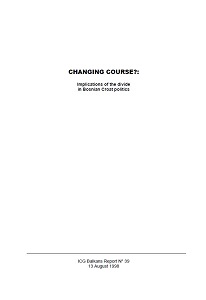CHANGING COURSE?: Implications of the divide in Bosnian Croat politics (ICG Balkans Report N° 39)
CHANGING COURSE?: Implications of the divide in Bosnian Croat politics (ICG Balkans Report N° 39)
Author(s): Author Not Specified
Subject(s): Inter-Ethnic Relations, Peace and Conflict Studies, Wars in Jugoslavia
Published by: ICG International Crisis Group
Keywords: Croatia and Hercegovina;
Summary/Abstract: The reintegration of Bosnia and Herzegovina (Bosnia) has been consistently obstructed by the main Bosnian Croat party, the Croat Democratic Union of Bosnia and Herzegovina (HDZBiH). The HDZBiH is dominated by hard-liners who emphasise the consolidation of a pure Croat-inhabited territory centred on western Herzegovina, with the eventual aim of seceding and joining Croatia. This policy has received support from hard-line elements in Croatia, including the president, Franjo Tudjman. Long-standing divisions between those who emphasise western Herzegovina and those who wish to secure the future of Croats throughout Bosnia have led to a split in the HDZBiH and the formation of the New Croat Initiative (Nova Hrvatska inicijativa or NHI), led by the Croat member of the joint Bosnian presidency, Kresimir Zubak. The rift in the HDZBiH widened after the death, at the beginning of May 1998, of the Croatian defence minister, Gojko Susak, which left the HDZBiH without a figure with the authority to hold together its different strands. At the HDZBiH congress in May 1998, the party's hard-liners, against Tudjman's wishes, secured the election of the Bosnian Federation's defence minister, Ante Jelavic, as party president, defeating the comparatively moderate candidate favoured by Zubak, Bozo Ljubic.
Series: ICG Balkans Report
- Page Count: 26
- Publication Year: 1998
- Language: English
- Content File-PDF
- Introduction

